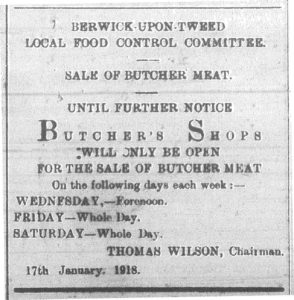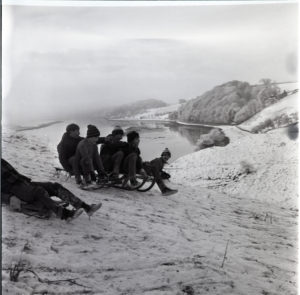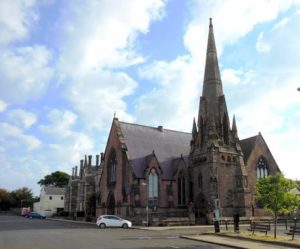
BERWICK ADVERTISER, 28 JUNE 1918
Comrades of the Great War
MEETING OF BERWICK BRANCH
The first general meeting of the Berwick Branch of the Comrades of the Great War was held on Tuesday evening in the Oddfellows’ Hall, when Mr John Thornton presided over a fair attendance.
The Chairman, in a short address, said that the reason of forming a branch was with the object of assisting others who were not so well off as themselves. The Association was non-political, as no wise soldier liked politics. A gratifying feature was that they had many members of Parliament and titled persons identifying themselves with the Association, and working for the ex-soldier. He was pleased to say fifteen members had joined since last meeting, so that they were now over 50, and that was not a bad beginning for three weeks, but they wanted far more in Berwick and district. He did not think the Association was one which would flatten out once the war was finished, and it was to be world-wide in its aims and objects.

There had been a campaign started in the general press at large to assist the ex-soldier, but he held that these efforts intended to do very little and he criticised the action of several prominent newspapers, as well as a member of parliament and others, who pretended to answer queries with the object of assisting the ex-soldier. The Association would only take up a case after it had been considered by the local War Pensions Committee. All who knew of deserving cases should state the circumstances as concisely as possible to the Secretary, Mr R. St. G. Tait, and a special printed form would be supplied to assist in filling in the necessary particulars. He mentioned also that Mr James Gibson, clerk to the local Pensions Committee, would only be too pleased to have any assistance in dealing with the too numerous cases placed in his hands. Mr Gibson had told him that three-fourths of his time was wasted in travelling from one house to another seeking information. Amid applause he intimated that he had received the first local donation to the funds. This was a cheque for £1 1s from Major Alex. Steven.
Mr C. Judge suggested that it would be a good thing to advertise appealing for funds.
It was announced that the Berwick Branch have fought and won their first case- a discharged Berwick soldier having received a calling-up notice to rejoin the colours. The local branch took the matter up: result-soldier notified by wire- “calling-up notice cancelled-exemption following.
BERWICK MILITARY TRIBUNALS
A NEWSPAPER EDITOR
Henry Smail Hamilton (42), Grade 11., editor and newspaper manager, residing at 4 Ravensdowne, Berwick, was a new case in which the man appealed on the ground of indispensability. A letter in support of this was read from Major H.R. Smail, N.F., explaining that Mr Hamilton had sole charge of the “Advertiser” Office, and was quite indispensable. If appellant had not gone into the business it would have been necessary for him Major Smail) to have returned to civil life, and now that he (Major Smail) had again gone on active service, it was all the more necessary to have Mr Hamilton in charge of the office.
The National Service Representative said he had no remarks to make.
Three months’ exemption was granted.
A BUSY TAILOR
Ralph Crammond (37), a Grade 111. man, tailor, formerly of Horncliffe, now employed by Messrs Paxton and Purves, Ltd., Berwick, was stated to be largely engaged in military work at the present time; and that the firm had only half of their former staff at a time which was now the height of the season. The firm was exceedingly busy, and had the greatest difficulty in completing orders. This was the firm’s first appeal, and it was hoped the Tribunal would take a favourable view and grant exemption. The man was married, and had a wife and two children, nine and eleven years respectively.
Mr Herriot- Is it competent to grant exemption on occupational grounds?
The National Service Representative – I am not quite certain; certainly it is not competent to grant exemption to a Grade 1 man.
In view of the low category three months’ exemption was granted.

CAPTAINCY AND BAR TO MILITARY CROSS
FOR LIEUT. IAN MACKAY
We extend our heartiest congratulations to Capt. Ian Mackay, M.C., R.F.A., on his having gained his third “pip.” We are also informed that Captain Mackay has been awarded a bar to his Military Cross for gallantry in the field.
Captain Mackay who is the eldest son of Dr. W. B. Mackay, C.M.G., enlisted in the early stages of the war and after having done his course with the O.T.C. was gazetted to the R.F.A. He has had some trying experiences in France and for gallantry in the field was awarded the M.C. two years ago. On one occasion last year he was buried by falling debris in an advanced gun pit, but happily escaped without injury. His experience of the front has varied from the sea to the Somme and that he has come through it all is a matter for congratulation. We trust he will advance still further in the honoured Corps to which he belongs and that he may long be spared to wear his decoration. His younger brother, Lieut. Eric Mackay, is in the R.A.F., and was recently in the town on a short leave.
SPITTAL SCHOOL MASTER KILLED IN ACTION
As we announced on June 14th Captain John Martin Tate was killed in action on May 27th. Mr Tate was a Bachelor of Science of Durham University and on the outbreak of war was an assistant master in Spittal Council School. Early in 1915 he obtained a commission as second lieutenant in the 14th Battalion Northumberland Fusiliers and soon afterwards was sent to France where he has taken part in most of the great struggles on the western front. During his three years as a soldier he has practically spent the whole time in fighting and strenuous work in France.
A year ago, on reaching the rank of Captain, Tate married a Newcastle lady, who occasionally visited Spittal and from whom we are able to give particulars of the gallant soldier’s death contained in a letter written to Mrs Tate by the Lieut. Colonel of the regiment. He says:- I regret more than I can tell you to have to write that your husband was killed in action on the 27th May. I know only too well that I can say little to soften the blow, but I say that death was instantaneous and that the manner of it was splendid and up to the highest traditions of the British Army. He and his men were surrounded and they counter-attacked the Hun repeatedly against terrific odds three times and on the last occasion your husband was killed leading his men. It was splendid and beyond praise. I miss and shall miss him; he was a friend as well as a perfect officer and was admired, respected, and loved by all. His courage and devotion to duty was of the highest order and I could and did always rely on him and never once did he fail. He would undoubtedly have gone far. He has been with me since 1915 and I cannot tell you how much his loss means to me. He was a husband to be proud of. The whole Battalion, or what are left of us, mourn his loss and cherish his memory.
His many friends in Spittal and especially the scholars and teachers of Spittal Council School regret the loss of a young man of marked ability who endeared himself to all during his short stay amongst them. To Mrs Tate they all express their deepest sympathy.

BERWICK FOOD CONTROL COMMITTEE
At the meeting last Monday, various transfers of ration cards were agreed to including one where the purchaser on account of removal wished to transfer from Berwick to Tweedmouth tradesmen.
Tea which is rationed in Berwick will not be rationed nationally when the new scheme books come into force on July 14. It is however possible to use a spare leaf in the book for this purpose, and the Berwick Food Control Committee is applying for power to increase the ration for tea to 2ozs. per head. Belford is not included in this application and will have to apply specially if it is thought desirable.
An application for an additional ration of butcher meat on medical grounds was agreed to.
The question of a supply of butcher meat for visitors to the Borough during the summer was brought before the Committee, and after consideration, it was agreed that the Chairman should call upon the Food Commissioner when in Newcastle to ascertain if some arrangement could not be made whereby an extra supply could be allocated for the summer visitors.




